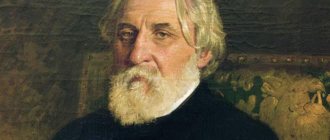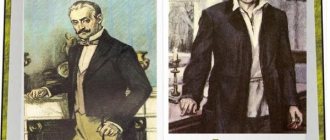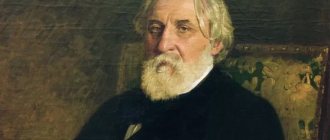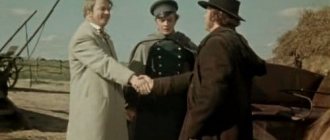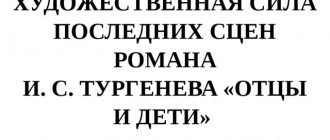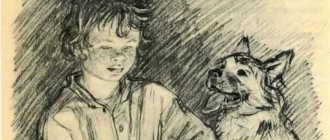I. S. Turgenev’s novel “Fathers and Sons” is a very important and rather unusual work. It can be called ideological, since its main character proclaims a certain idea - the idea of nihilism. The novel can be called unusual because its relevance will never be lost, since the problem of fathers and sons is one of the eternal problems of humanity. In addition, I. S. Turgenev introduced one innovation into Russian literature of the 19th century: Bazarov, the main character of the novel, is a commoner. It should be noted that not only the plot of the novel and its characters are unusual, but also such an important moment in the storyline as the epilogue, from which we learn about what happened to the heroes of the work after the end of the story. So, Turgenev very briefly, but at the same time succinctly tells us about the future fate of people, pointing out those smallest details in which the essence of each of the heroes is revealed. I think it would be most logical to talk about the characters in the order in which they are presented in the epilogue, so I would like to start with Anna Sergeevna Odintsova. As we learn, she married “a very smart man, a lawyer, with a strong practical sense, a strong will and a wonderful gift of speech - a man still young, kind and cold as ice.” Such a description of Odintsova’s chosen one cannot but speak about the peculiarities of her character. This woman herself is cold as ice (remember the scene after the explanation with Bazarov), she is surprised by any emotions that suddenly overwhelm her, since Odintsova’s main character traits are calmness and love of order. She arranged her entire life according to such a regular schedule that there was no room for either boredom or feelings. Next, Turgenev describes the quiet life of the Kirsanovs: Nikolai Petrovich and Arkady. In their common large family, peace and quiet reign, everyone is busy with their own business, there is no more room for Fenichka’s embarrassment, but instead there is prosperity in the economy and family happiness. In addition, the growing up of a new, younger generation is becoming a very important detail. It is with this that Turgenev makes us understand that he connects the future of the country and its society with the Kirsanov family. It is worth noting that in the epilogue the author does not call Pavel Petrovich “Kirsanov”. For Turgenev, the unity of the two brothers no longer exists, since the future of Russia cannot be connected with conservative people. So, Pavel Petrovich leaves for Dresden, and his name is now “der Herr Baron von Kirsanoff.” Despite the fact that he becomes a true Englishman, does not read anything Russian, still remains a role model in society, he is respected and revered, the author points out to us one, at first glance, insignificant detail. On Pavel Petrovich’s table there is a silver ashtray in the shape of a peasant’s bast shoe. This is a rather funny nuance, considering how our hero treated the peasants in his homeland (he could not talk to them without holding a scented handkerchief to his face). This bast shoe is just a tribute to fashion, a kind of symbol of Russian origin, which was very respected abroad. A silver ashtray abroad, cufflinks with precious stones in the countryside - all this is surprisingly vulgar and insincere. Unfortunately, it would be difficult to imagine Pavel Petrovich’s mad love for the people, and this speaks of the incorrigibility of his character, and therefore the impossibility of looking at the future through the prism of his image. As for the false nihilists - Kukshina and Sitnikov, they, like Pavel Petrovich, have not changed at all internally. Kukshina still communicates with students, only on the subject of architecture, not natural sciences. Sitnikov proudly calls himself the continuer of Bazarov’s “work” and does absolutely nothing. They are both irrevocably stupid and static. In the epilogue, the author points out one very strange circumstance: none of the heroes remembers Bazarov, and only his grief-stricken parents come to their son’s grave. In my opinion, this can be explained by the inevitable collapse of Bazarov’s idea, for which he died. The future could not belong to nihilism, since it consists in denial, and it is impossible to deny everything. This idea led to a dead end, and it was forgotten, as well as everything that had become obsolete. Only Bazarov’s grave speaks of “eternal reconciliation and endless life.” In conclusion, I would like to say that in the epilogue of the novel “Fathers and Sons” I. S. Turgenev says that everything unnecessary lives out its time, never to return. The author expresses his hope for a happy future for our country, placing it in the hands of Nikolai Petrovich and Arkady.
Related materials:
- Writer and character: the problem of relationships. (Based on the cycle of stories by I. S. Turgenev “Notes of a Hunter”, novels by I. S. Turgenev “Fathers and Sons” and M. Yu. Lermontov “Hero of Our Time”) - -
- Man’s search for the meaning of life in the works of A. P. Platonov — —
- “Forgiveness or farewell? The last sunset novel" (M. A. Bulgakov). (The theme of forgiveness in M. A. Bulgakov’s novel “The Master and Margarita”) — —
- “The time will come when there will be no power of the Caesars, nor any other power” (M. Bulgakov). (The theme of power in the novel “The Master and Margarita”) — —
- “Light” and “peace” in M. A. Bulgakov’s novel “The Master and Margarita” — —

